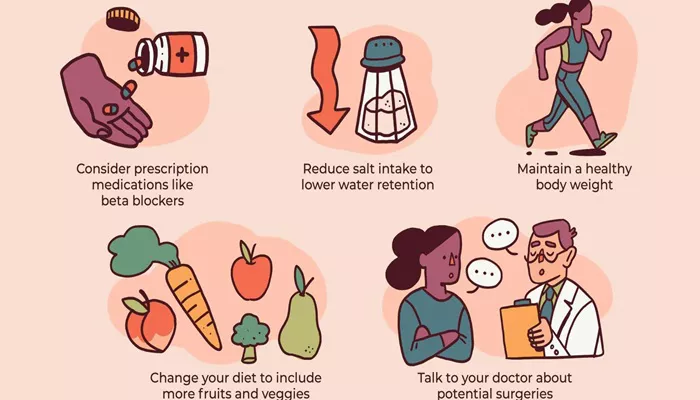Heart failure, a condition where the heart is unable to pump blood effectively, presents significant challenges for managing weight. Excess weight can exacerbate heart failure symptoms, making it crucial to approach weight loss with care and consideration. This article will provide a comprehensive guide on how to safely and effectively lose weight while managing heart failure, including dietary strategies, exercise recommendations, and lifestyle changes.
Understanding Heart Failure And Weight Management
Heart failure is a serious condition characterized by the heart’s inability to pump enough blood to meet the body’s needs.
This can lead to symptoms such as shortness of breath, fatigue, and fluid retention.
Managing weight is crucial in heart failure because excess body weight can increase the heart’s workload, worsen symptoms, and lead to additional health problems.
SEE ALSO: How Much Exercise Should You Do with Heart Failure?
The Importance of Weight Management in Heart Failure
Managing weight in heart failure is not just about appearance but about overall health and well-being. Excess weight can:
Increase Cardiac Workload: Extra pounds put more strain on the heart, making it harder for it to pump efficiently.
Worsen Symptoms: Obesity can exacerbate symptoms like shortness of breath and fatigue.
Lead to Complications: Excess weight is associated with a higher risk of diabetes, hypertension, and other conditions that can further strain the heart.
Safe Weight Loss Strategies for Heart Failure
When aiming to lose weight with heart failure, it is essential to prioritize safety and effectiveness. Here are key strategies to consider:
1. Consult with Healthcare Providers
Before starting any weight loss program, consult with healthcare professionals. They can provide personalized advice based on your specific condition and needs. Regular check-ups can help monitor your progress and make necessary adjustments to your plan.
2. Adopt a Heart-Healthy Diet
A well-balanced diet is crucial for weight management and heart health. Here are some dietary principles to follow:
Reduce Sodium Intake: High sodium levels can cause fluid retention, worsening heart failure symptoms. Aim to consume less than 2,000 milligrams of sodium per day.
Increase Fiber: Foods high in fiber, such as fruits, vegetables, whole grains, and legumes, can help with weight loss and improve heart health.
Choose Lean Proteins: Opt for lean protein sources like poultry, fish, beans, and tofu to support muscle maintenance while managing calories.
Limit Saturated Fats and Sugars: Reduce intake of saturated fats and added sugars to prevent additional strain on the heart and avoid weight gain.
Control Portion Sizes: Be mindful of portion sizes to manage calorie intake and prevent overeating.
3. Monitor Fluid Intake
Fluid management is critical for individuals with heart failure. Monitor your fluid intake to prevent fluid buildup, which can exacerbate heart failure symptoms. Your healthcare provider will guide you on the appropriate amount of fluid to consume daily.
4. Implement Gradual Changes
Rapid weight loss can be harmful, especially for those with heart failure. Implement gradual changes to avoid stressing the heart. Aim for a steady weight loss of 1-2 pounds per week.
5. Engage in Safe Physical Activity
Exercise can help with weight loss and improve heart health, but it is important to choose activities that are safe and appropriate for your condition:
Consult Your Doctor: Before starting any exercise regimen, get clearance from your healthcare provider to ensure that the activities are safe for your heart condition.
Start Slow: Begin with low-intensity exercises such as walking, stretching, or gentle yoga. Gradually increase the intensity and duration as tolerated.
Incorporate Aerobic Exercise: Aerobic exercises like walking, swimming, or cycling can help burn calories and improve cardiovascular health. Aim for at least 150 minutes of moderate-intensity aerobic activity per week.
Include Strength Training: Strength training exercises can help build muscle mass and increase metabolism. Perform strength training exercises 2-3 times per week, focusing on major muscle groups.
6. Focus on Lifestyle Changes
In addition to diet and exercise, lifestyle changes can support weight management:
Get Adequate Sleep: Poor sleep can affect weight and heart health. Aim for 7-9 hours of quality sleep per night.
Manage Stress: Chronic stress can lead to weight gain and worsen heart failure symptoms. Practice stress-reducing techniques such as deep breathing, meditation, or counseling.
Avoid Smoking and Limit Alcohol: Smoking and excessive alcohol intake can negatively impact heart health. Seek support to quit smoking and limit alcohol consumption.
7. Monitor Progress and Adjust
Regularly monitor your progress and make adjustments as needed.
Keep track of your weight, dietary intake, and physical activity. Use this information to make informed decisions and adjustments to your weight loss plan.
Potential Challenges And How to Overcome Them
Losing weight with heart failure can present challenges. Here are some common issues and strategies to address them:
Fluid Retention: If you experience fluid retention despite following dietary guidelines, consult your healthcare provider.
They may recommend medications or other interventions.
Fatigue: Fatigue can make it difficult to stay active. Start with short, manageable exercise sessions and gradually increase as your energy levels improve.
Motivation: Maintaining motivation can be challenging. Set realistic goals, celebrate small achievements, and seek support from healthcare providers, family, and friends.
Conclusion
Losing weight with heart failure requires a careful and thoughtful approach. By adopting a heart-healthy diet, engaging in safe physical activity, and making lifestyle changes, you can achieve weight loss while managing your heart condition.
Always work closely with your healthcare provider to ensure that your weight loss plan is safe and effective for your individual needs. Managing heart failure and achieving weight loss is a journey that requires patience, persistence, and support.

